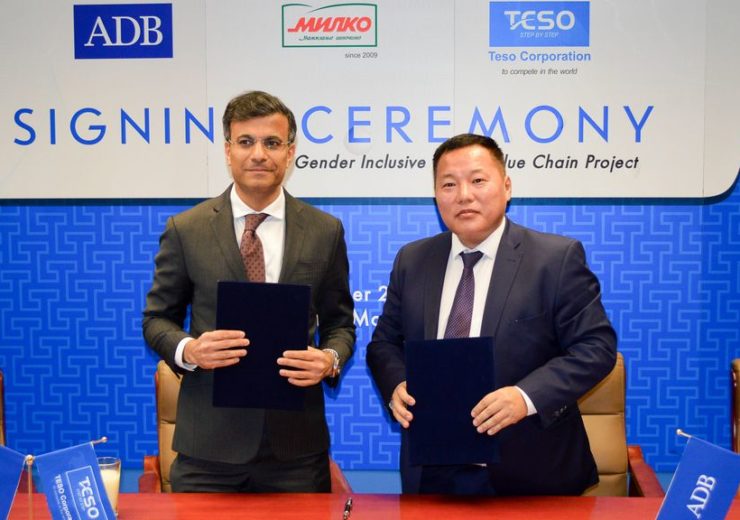The loan to Milko from ADB will help the company to source raw milk directly from rural communities

Image: Pavit Ramachandran and Tsogtgerel Odon during the signing of the loan agreement in Ulaanbaatar, Mongolia. Photo: Courtesy of The Asian Development Bank.
The Asian Development Bank (ADB) has agreed to provide $7.5m loan to Milko, a dairy company in Mongolia, to support the company’s dairy expansion plans.
The expansion is expected to empower rural people throughout it supply chain. The project will also help Milko to develop its raw milk sourcing and processing capacity.
Nearly half of Milko’s raw milk is sourced from smallholder milk suppliers and herders from its collection centres. The direct sourcing not only helps herders and communities in earning extra income, but also the company in boosting its sustainable and reliable source of raw material.
With ADB’s loan, Milko will be able to procure equipment, invest in efficient management systems, and ensure that its end-to-end operations adhere to international certification standards.
It will also increase the company’s export opportunities in international markets including China and Kazakhstan.
ADB Mongolia country director Pavit Ramachandran said: “Investing in agricultural value chains can yield solid economic and development impacts. This project is good news for rural households, as one-third of Mongolia’s population lives in rural areas and their livelihoods oftentimes depend on animal husbandry and milk production.”
ADB’s loan will help Milko increase the share of women in procurement
ADB will not only provide the loan but will also help the company to develop and implement a plan that helps to increase the economic share of women from Milko’s procurement of raw milk.
Teso president of Tsogtgerel Odon said: “This loan agreement underpins the mutual aims of Teso and ADB to support rural livelihoods especially for women and to further spur dairy processing and exports by a Mongolian company.”
In October, ADB and the Government of Mongolia completed one eco-tourism project and began on a second eco-tourism project in the country.
These projects aim to increase the number of domestic and overseas tourists while safeguarding environment.
The Integrated Livelihoods Improvement and Sustainable Tourism in Khuvsgul Lake National Park Project, funded with a $3m grant from the Japan Fund for Poverty Reduction, helps build local tourism activities, improve livestock and pasture management, and strengthen waste management around Khuvsgul Lake.
The $38m loan under the Sustainable Tourism Development Project will be used to build on the activities in Khuvsgul Lake and develop similar initiatives in Onon-Balj National Park.
